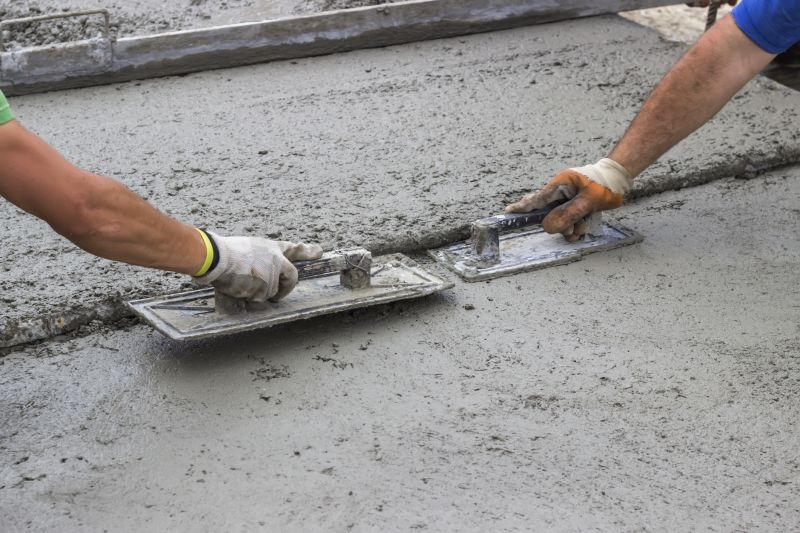Popular Choices For Concrete Installation To Boost Project Quality
Utilize highly recommended tools and supplies to streamline your concrete work and ensure lasting results.
 Concrete installations are fundamental to a wide range of construction and renovation projects in Simi Valley, CA. Whether creating durable sidewalks, sturdy driveways, or foundational slabs, selecting the right products ensures safety, longevity, and structural integrity. The variety of tools and materials available for concrete work can seem overwhelming, but understanding the key types helps in making informed choices. From mixing and pouring to finishing and sealing, each step requires specific products designed to meet the demands of concrete applications.
Concrete installations are fundamental to a wide range of construction and renovation projects in Simi Valley, CA. Whether creating durable sidewalks, sturdy driveways, or foundational slabs, selecting the right products ensures safety, longevity, and structural integrity. The variety of tools and materials available for concrete work can seem overwhelming, but understanding the key types helps in making informed choices. From mixing and pouring to finishing and sealing, each step requires specific products designed to meet the demands of concrete applications.
Top Overall Option
Concrete Mixing and Curing Kit
A comprehensive concrete mixing and curing kit provides all the essential components needed for a successful installation. It includes high-quality concrete mix, curing compounds, and tools for mixing and application, ensuring consistent results and durability. This type of kit simplifies the process for both DIYers and professionals, offering convenience and reliable performance in a single package.
Types of Products For Concrete Installations
Concrete Mix
Pre-blended concrete mixes designed for various applications, from slabs to pathways, offering convenience and consistent composition.
Reinforcing Mesh and Rebar
Steel reinforcement materials used to strengthen concrete structures and prevent cracking under load.
Formwork and Molds
Temporary or permanent molds that shape the concrete during pouring, available in various materials like wood, metal, or plastic.
Concrete Vibrators
Tools used to eliminate air bubbles and ensure proper compaction of poured concrete for a smooth finish.
Finishing Tools
Includes trowels, floats, edgers, and jointing tools for achieving a professional surface and pattern.
Sealants and Waterproofing Products
Protective coatings and sealants that enhance durability and resistance to water and wear.
Curing Compounds
Products applied to freshly poured concrete to retain moisture and facilitate proper curing.
Surface Preparation Tools
Equipment such as grinders and scarifiers used to prepare existing concrete surfaces for repairs or overlays.
Expansion Joints
Materials used to control cracking by allowing movement within concrete slabs.
Admixtures
Chemical additives that modify concrete properties such as setting time, workability, and strength.
Concrete Repair Products
Patch and repair compounds designed to fix cracks, chips, and surface damage.
Surface Texturing Tools
Tools for creating patterns or slip-resistant surfaces on cured concrete.
Popular Choices
Pre-mixed concrete delivered in bulk or bags, suitable for various projects with minimal preparation.
Common reinforcement materials used to enhance structural integrity in slabs and foundations.
Hand tools essential for finishing and smoothing concrete surfaces.
Protective coatings that help resist stains and weathering, prolonging surface life.
Reusable or disposable forms used to shape poured concrete, available in wood, plastic, or metal.
Materials used to cover and retain moisture during the curing process.
Tools to ensure proper compaction and eliminate voids in poured concrete.
Flexible strips or sealants to accommodate movement and prevent cracking.
Equipment for leveling and smoothing existing concrete surfaces before overlays or repairs.
Additives to modify setting times, workability, or strength characteristics of concrete.
Proper preparation is essential for successful concrete installation. This includes selecting appropriate formwork, reinforcement materials, and curing products. For finishing, tools like trowels, floats, and edgers help achieve a smooth surface and professional appearance. Protective and sealing products are also crucial to maintain the concrete's durability over time, especially in climates like Simi Valley where exposure to the elements is common.
Investing in quality products tailored for concrete work can significantly impact the outcome of your project. While many options are available, understanding the purpose and application of each product type helps in selecting the most suitable tools and materials. Whether you're a DIY enthusiast or a professional contractor, choosing reliable, effective products is key to ensuring your concrete installation meets your expectations and withstands the test of time.
Key Buying Considerations
- Determine the specific application and required strength of the concrete to select appropriate products.
- Consider environmental exposure, such as weather conditions, which may influence the choice of sealants and curing products.
- Evaluate the size and scope of your project to decide between bags, bulk delivery, or professional-grade equipment.
- Ensure compatibility of reinforcement materials with the concrete mix for optimal structural performance.
- Look for tools and products that facilitate ease of use, especially for DIY projects, without sacrificing quality.
- Assess the drying and curing times to coordinate project timelines effectively.
- Select formwork materials that are durable, reusable, and suitable for the desired shape and size.
- Prioritize safety features in tools such as vibrators and grinders, including ergonomic design and protective features.
- Check for product certifications or standards that indicate quality and suitability for concrete work.
- Consider the long-term maintenance and sealing options to preserve the appearance and integrity of the installation.
- Review customer feedback and product ratings to gauge reliability and performance.
- Balance cost with quality to ensure value without compromising essential features.
- Identify whether specialized tools, such as textured surface equipment, are necessary for your project.
- Plan for storage and handling of materials, especially for larger quantities or bulk orders.
- Consult local suppliers or professionals to ensure products meet regional requirements and conditions.
